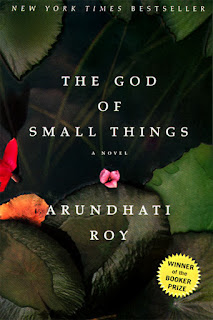I generally do not read fiction and i generally dislike Arundhati Roy. The reasons for my dislike of Ms Arundhati Roy are manifold but the most important one is her jaundiced intellectualism. Yet i bought her 'The God Of Small Things' but only to read many years later. Its a story weaved in a peculiar social caste ridden structure of Syrian Christians in God's own country. The plot of the book is not that great but its a good tome to understand
the society, customs and caste structure of Syrian Christians. We have read this plot in many books, seen in many movies and experienced in various situations but to me the knowledge of "strict" adherence of caste system in this non-Hindu society came as a shock. The climax is not a climax at all and like numerous such stories the low caste guy had to pay for their carnal "sin" against the centuries old laws. The book starts at a snail pace (and you have to be show extreme patience) with some suspense in the middle but the climax is too mediocre.
To me the story meant nothing and is full of stereotypes; there are stereotypes of Hindu pilgrims, communist leader, communist workers, Syrian Christians etc but the description of Syrian Christians (if true) is indeed a learning for me. The description of the natural beauty of Kerala is mesmerizing and the choice of words awe-inspiring. This book was awarded Booker Prize in 1997 and certainly the prize has made this book a 'best seller' just like The White Tiger of Aravind Adiga. Had this book been written in a predominantly Hindu society it would have come as full of cliches, the Syrian Christian household is its only savior.
Recommended (7/10)



